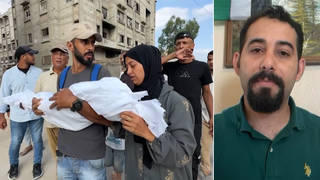
Guests
- Mahmoud SalahNakba survivor who was forced out of his home village of Sar’a in 1948.
Palestinians are staging a new round of protests in Gaza today to mark the 70th anniversary of the Nakba, or the Day of Catastrophe, when more than 700,000 Palestinians were forced to flee or were expelled from their homes. Today’s protests come after the Israeli military killed 61 unarmed Palestinian protesters on Monday. In total, since the Palestinians launched the Great March of Return protests on March 30, the Israeli military has killed at least 109 Palestinians and wounded 12,000 people. For more, we speak with a Nakba survivor: 86-year-old Mahmoud Salah, who was born in a village just outside of Jerusalem that was bombed and invaded when he was a teenager in 1948.
Transcript
AMY GOODMAN: This is Democracy Now! I’m Amy Goodman, with Juan González, as we turn to someone who survived the Nakba 70 years ago. His name is Mahmoud Salah. He is 86 years old, born in a village just outside Jerusalem that was bombed and invaded when he was a teenager in 1948. He described how his family sought refuge in what’s now the West Bank. He slept in caves, under trees, moving from refugee camp to refugee camp, before the U.N. eventually sent him on a ship to South America, Venezuela. Then he went to Colombia. He has since returned to his village, Sar’a, but says not much remains of it, except for the shrine of Samson, which is now an Israeli tourist attraction. I spoke to Mahmoud Salah on Monday where he now lives, in Chicago, and I asked him what that word, “Nakba,” Arabic for “Catastrophe,” means to him.
MAHMOUD SALAH: Nakba means it is a disaster of my heart, a disaster of my family, a disaster of my soul, a disaster of my country, because it is—the Nakba, it is the history of my country, of my grandfather, grandmother, the disaster of my even faith, my religion, my school. It was destroyed. The Nakba, it is—Nakba, it is a word that is a very, very strange word, a hard word. It is still in my heart. And I give it to my sons. I give it to my—everybody I know from the family.
AMY GOODMAN: Mahmoud Salah, what are your thoughts as President Trump moves the U.S. Embassy from Tel Aviv to Jerusalem?
MAHMOUD SALAH: Jerusalem is not his house. And he is not the one who makes the decision to give this Aqsa or Jerusalem to another people. If he is the real president, Mr. Trump, he should make peace, peace between two people.
AMY GOODMAN: When you see what’s happening in Gaza right now, the nonviolent protests on the border with Israel, the latest count we have is 50—Israeli military has killed 50 Palestinians. Your response?
MAHMOUD SALAH: I say to the people of Gaza, you are the most brave people ever, and you are defending your right. And don’t worry; if you die, you go to God. You go to Jannah. You go to paradise. And keep fighting and keep struggling, but with peace, peace, peaceful, peaceful demonstration. Don’t kill. If they kill you, you go with God—to God. If you stay alive, maybe very soon the Gaza will win.
AMY GOODMAN: That’s Mahmoud Salah, speaking to us from Chicago. He is 86 years old. He was forced out of his village with his family and his neighbors, Sar’a, 70 years ago, a Nakba survivor.












Media Options